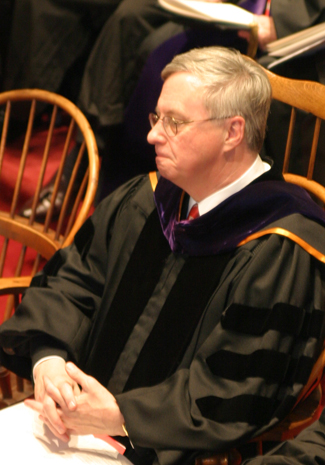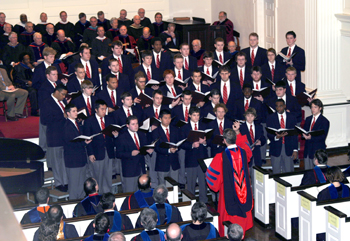Dr. Patrick E. White challenged the Wabash College community to honor its cherished traditions and embrace the tradition of change during Saturday afternoon’s Inauguration ceremonies.
White, who took office July 1, 2006, was officially inaugurated in a ceremony of pomp and fanfare in the College Chapel. An Inaugural Gala followed in Knowling Fieldhouse. See photo album from Inauguration Ceremony by clicking here.
The president built his speech much like the College, upon the past but looking to the future. "We honor our founders most, not when we try to do only what they would have done, but when we attempt to live as they lived and dream as they dreamed," White said. "The dreams of Wabash men do not spring full grown from the head of Zeus; they are built on the best imaginations of those who have gone before us." Hear White's full speech by podcast.
Before the president took the Chapel podium, he was honored, welcomed, and praised by a host of dignitaries and colleagues. The Chapel was packed with family, faculty, staff and 36 delegates, including 15 college presidents.
 The higher education community, Wabash alumni, students, faculty, and old friends praised and welcomed White as the College's 15th president. The Wabash College Glee Club sang two anthems and after White's remarks performed Alma Mater.
The higher education community, Wabash alumni, students, faculty, and old friends praised and welcomed White as the College's 15th president. The Wabash College Glee Club sang two anthems and after White's remarks performed Alma Mater.
The late afternoon sun shone brightly through Chapel windows as White took the podium after receiving the official charter from the Chairman of the board of Trustees Joe Barnette.
White cautioned that tradition does not mean inertia, or a repetition of the past. "We honor the past by embracing our time and our age with the vigor, the energy, the pride, the confidence, and the willingness to fight harder for what is right.
"Wabash has a tradition, but that tradition also is paradoxically a tradition of change and innovation."
The new president suggested eyes are on Wabash. He asked those gathered to contemplate the greater mission and think about what the country demands of a liberally educated young man.
"When throughout the United States boys and men often lag behind in their achievement of higher education, can Wabash and its success in the education of men provide solutions? In cultures around the world, masculinity is viewed more as pathology than a virtue, more a problem than a solution. Wabash, though, has guided men to the realization of what it means to be a leader and a gentleman."
 White was specific in the characteristics Wabash could teach higher education and the world. The new president suggested Wabash can and should lead the discussion of how best to educate men. We should hold up our example of a fraternity system that works: athletes as students first; the successes of the Malcolm X Institute and Unidos Por Sangre as the blessings of diversity.
White was specific in the characteristics Wabash could teach higher education and the world. The new president suggested Wabash can and should lead the discussion of how best to educate men. We should hold up our example of a fraternity system that works: athletes as students first; the successes of the Malcolm X Institute and Unidos Por Sangre as the blessings of diversity.
"We have more to learn, and much to teach," White said
"We will find a way to be engines of equality in a world of inequality; to be agents of peace in a world at war; to be makers of complexity and careful thinking in an age that wants to replace thinking with slogan saying; we can exude empathy and caring in place of selfishness and obliteration," he said.
White challenged Wabash men to seek discourse and argument, praise the honor of good men, and to embrace our commitment to live humanely.
"We are a small College and many in America and in the larger world may neither note nor little care what we do here, but the world needs Wabash and our education. The wants of the country demand our achievements and our leadership," White said, echoing the words of Wabash’s first president, Elihu Baldwin.
He pledged in his concluding remarks to work side-by-side with Wabash men to carry the College to new heights.
"We will ask the difficult questions of our times and we will never tire," White proclaimed. "In our uncommon dream – the uncommon dream of Wabash College – lies the common good of our country and our world, and we will pursue that dream with our whole heart, mind, and spirit.
"Wabash Always Fights."